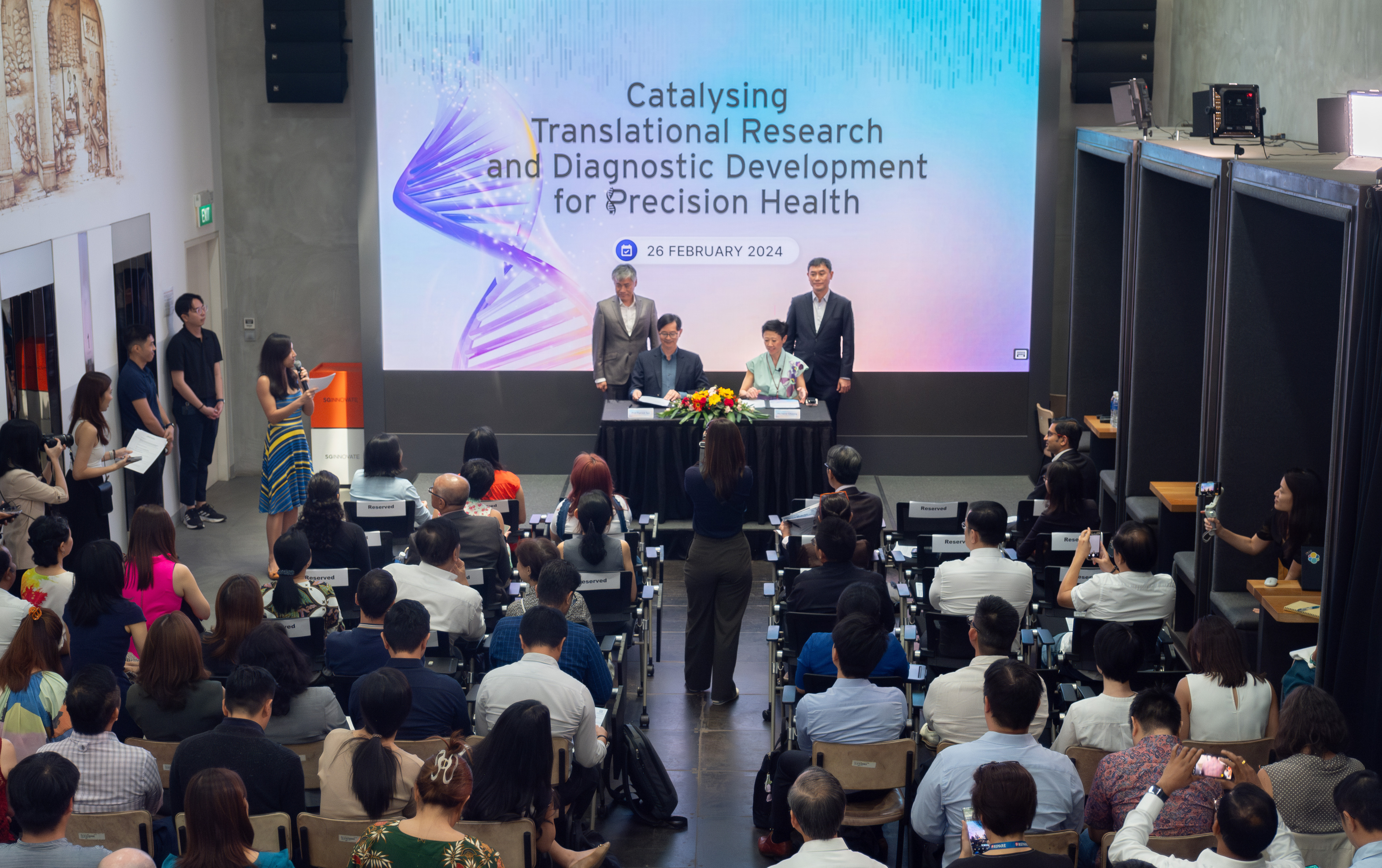PRECISE and DxD Hub Partnership: A Milestone Development for Precision Health in Singapore
The inking of the memorandum of understanding (MOU) between Precision Health Research, Singapore (PRECISE) and Diagnostics Development Hub (DxD Hub) on 26 February 2024 ushers the beginning of an exciting new phase in Singapore’s National Precision Medicine (NPM) journey.
With the formalisation of the strategic partnership, researchers can now not only utilise datasets from the NPM programme for research and discovery, but also catalyse their translational research efforts and productise their discoveries by leveraging the expertise of DxD Hub.
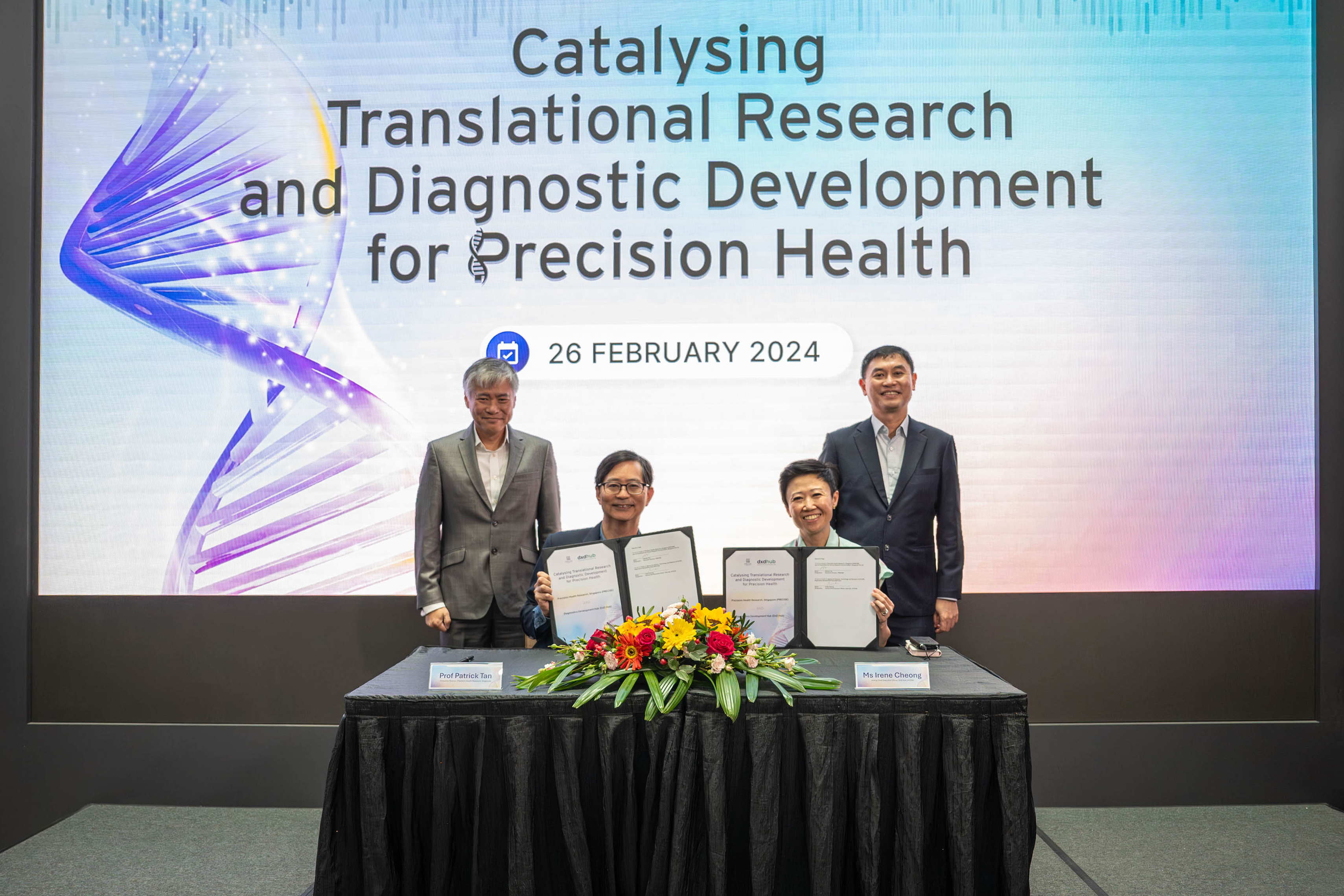
“Three goals underpin the NPM programme that PRECISE is coordinating. They are—Research, Innovation and Enterprise. With the MOU we are signing with DxD Hub today, we aim to catalyse this ambition by creating opportunities that enable us to accelerate progress from genomic data insights to diagnostic products. In addition, we hope this partnership will enable the local healthcare ecosystem to parlay into the development of therapeutics for genomic medicine,” said Professor Patrick Tan, Executive Director, PRECISE, at the MOU signing ceremony.
Ms Irene Cheong, Acting Chief Executive Officer, DxD Hub, echoed similar sentiments. She said, “One of our foci at DxD Hub is diseases more prevalent in Asia, especially in Singapore. We recognise the value of leveraging our understanding of Asian biology and phenotypes to bring innovations and diagnostics for sometimes overlooked Asian-centric diseases to the marketplace. With the MOU, we look forward to working even more closely with PRECISE and its network of researchers and clinicians to unlock more of such valuable opportunities.”
Improving Clinical Outcomes with NPM Data Insights
The first of the three-phase NPM roadmap was completed in 2021. The Phase I findings (from the SG10K_Health study) established a Singaporean reference database containing 10,000 genomes. It revealed important knowledge regarding genetic variations in disease risk and drug reactions among different ethnicities. Researchers and clinicians can use the reference database to improve genetic analysis of Asian population and management of patients with genetic conditions.
Dr Saumya Shekhar Jamuar, Director, SingHealth Duke-NUS Institute of Precision Medicine (PRISM) and Senior Consultant, Genetics Service, KK Women’s and Children’s Hospital (KKH) shared, “SG10K_Health has proven to be a very useful resource when it comes to diagnosing rare diseases. Before SG10K_Health, one of the biggest challenges we faced was that we only had reference genomic data from mostly non-Asians. It was therefore hard to ascertain if a particular variant is rare in the general population or rare in the population unique to this patient’s demographic? But with the dataset and insights that PRECISE has generated through the NPM programme, we can now make meaningful comparisons —and more confidently interpret genetic variants of concern.”
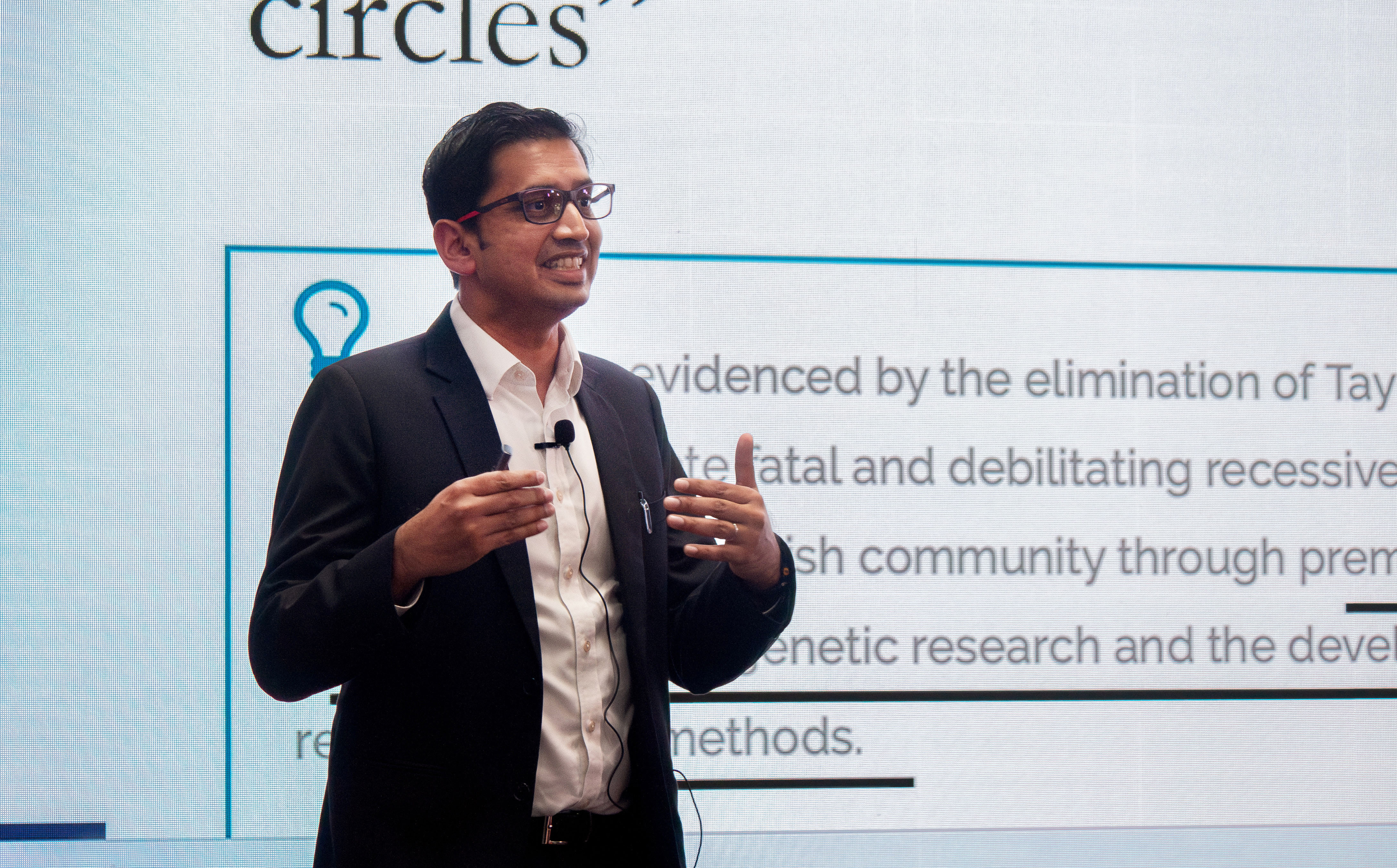
Dr Saumya Shekhar Jamuar, Director, SingHealth Duke-NUS PRISM and Senior Consultant, Genetics Service, KKH
Inspired by the sharing, Mr Jason Ng, Legal Lead from ClavystBio, said, “It is heartening to see how different parts of the ecosystem are rallying behind PRECISE to translate data into insights—and push for groundbreaking innovation. This goes to show that the work that PRECISE is doing is very important. We are aligned in that vision—and are excited to contribute towards its realisation.”
Leveraging NPM Datasets as an Enabler for Innovation
Notably, the use of these data insights is not limited to translational research. The rich data output from the NPM programme also has the potential to be converted into novel diagnostic assays and instrument platforms like a customised genetic test panel that screen for carriers of common severe recessive diseases among Singaporeans. The panel recently developed by Dr Jamuar and his colleagues at KKH and PRISM in partnership with DxD Hub was facilitated by PRECISE.
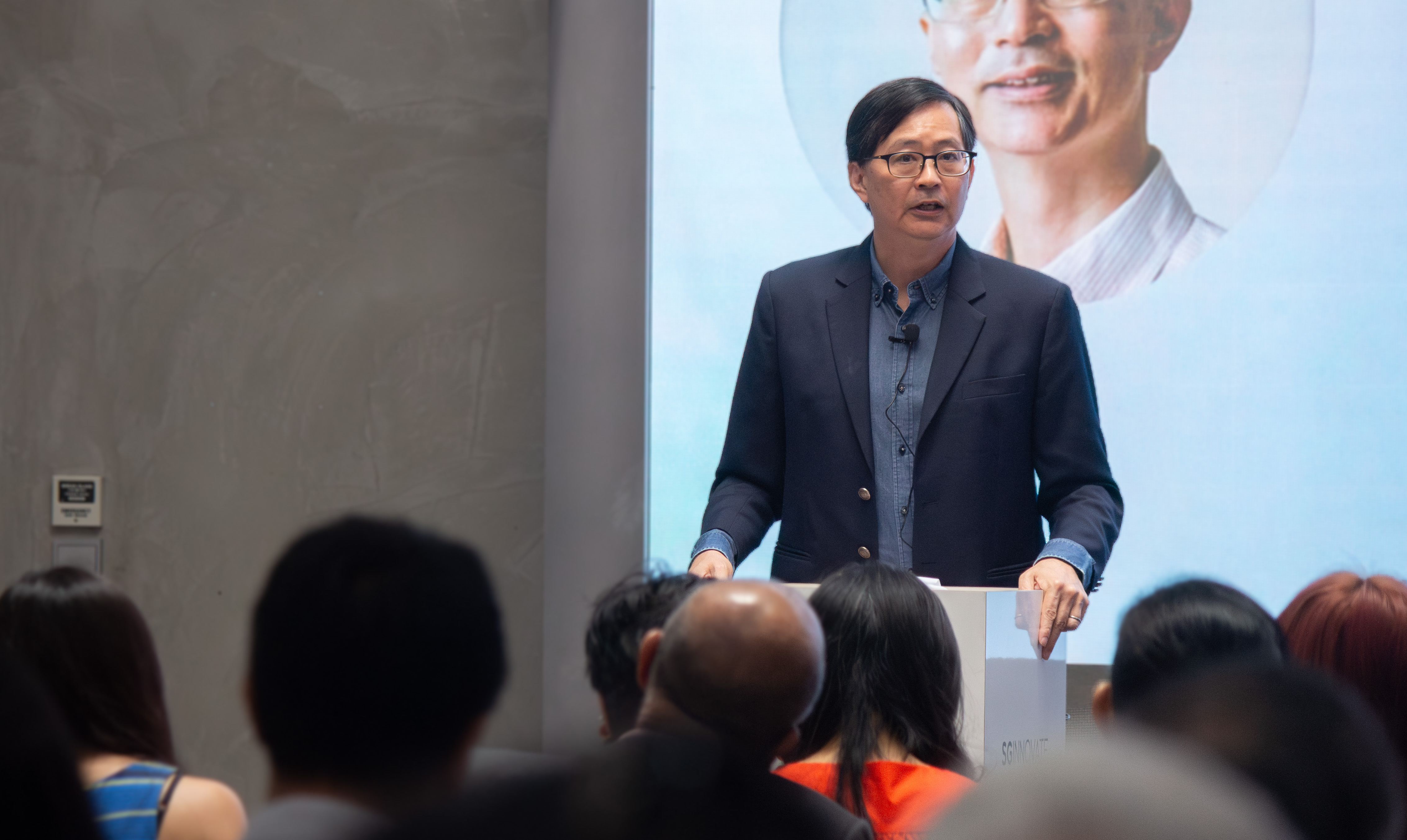
Prof Patrick Tan, Executive Director, PRECISE
Prof Patrick Tan said, “This is a compelling use case of NPM’s journey from bench to bedside—and PRECISE is privileged to facilitate the creation of this customised genetic test panel. Such is the value of PRECISE. We facilitate access to data through our research partners, bring people together and subsequently step back so that you do what you are good at. In this instance, through bringing together Dr Jamuar’s team at PRISM and KKH, and DxD Hub, we empowered the translation of insights from a paper into a product that can be commercialised and industrialised to benefit the Singapore population. We also hope to positively impact diverse communities globally, particularly Asians, as commercial panels have been mostly designed for Caucasian populations. After the MOU today, we look forward to facilitating more of such partnerships.”
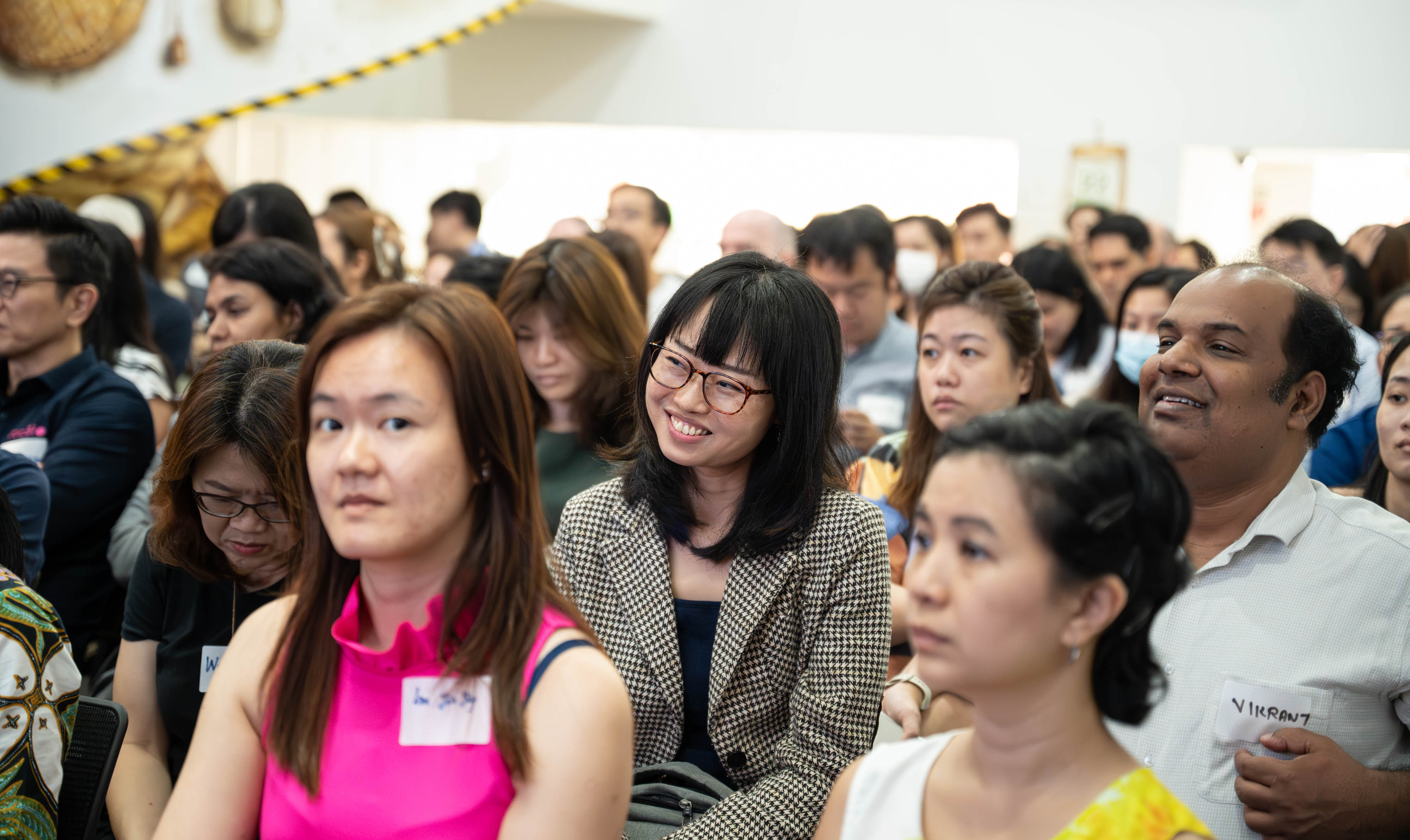
Dr Zhao Pan (middle), Vice President, Genomics, MiRXES
Expressing her excitement about the news, Dr Zhao Pan, Vice President, Genomics, MiRXES, said, “I am so glad to see such enthusiasm from fellow industry players, researchers and clinicians. We look forward to developing Asian specific genetic tests through the NPM dataset and the MOU.”
Realising Opportunities to Transform Global Healthcare
The NPM Phase II that was launched in 2021 is ongoing. In December 2022, the PRECISE-SG100K study was launched as part of NPM Phase II. When completed, the study will provide detailed characterisation of 100,000 Singaporeans—enabling the identification of social, environmental, lifestyle and genetic factors associated with diseases prevalent in Singapore and the Asian region for the first time.
To positively and sustainably impact clinical outcomes at scale however, it is crucial for corporations and industry players with expert productisation manufacturing know-how to be engaged. They are essential for translating findings into efficacious medicines and products that can be used safely in humans, and manufacture and distribute these products to hospitals and communities. Their abilities to convert rich data output from the NPM into novel diagnostic assays and instrument platforms is also necessary to bolster the aspiration of precision medicine in disease prevention.
“My company is into precision oncology. Given the increasing prevalence of cancer disease in the ageing Singapore population and rising costs of cancer drugs and treatments, we see a great opportunity to leverage the MOU and data insights from the NPM programme to strengthen our offerings and its accessibility to the market—helping more people in the process,” said Ms Sivanissawary Manoharan, Research Assistant, LifeStrands Genomics.
“We are on track to complete NPM Phase II by early 2025. Together, I am confident that the PRECISE-SG100K population cohort study will advance the understanding of our researchers and clinicians on diseases and health conditions for both Singaporeans and the wider Asian population. More significantly, we hope the data generated from our NPM journey can catalyse and enable innovation and enterprise across diverse emerging and adjacent industries along the health and wellness value chain to tangibly benefit patients and communities alike,” Prof Patrick Tan rounded up.
